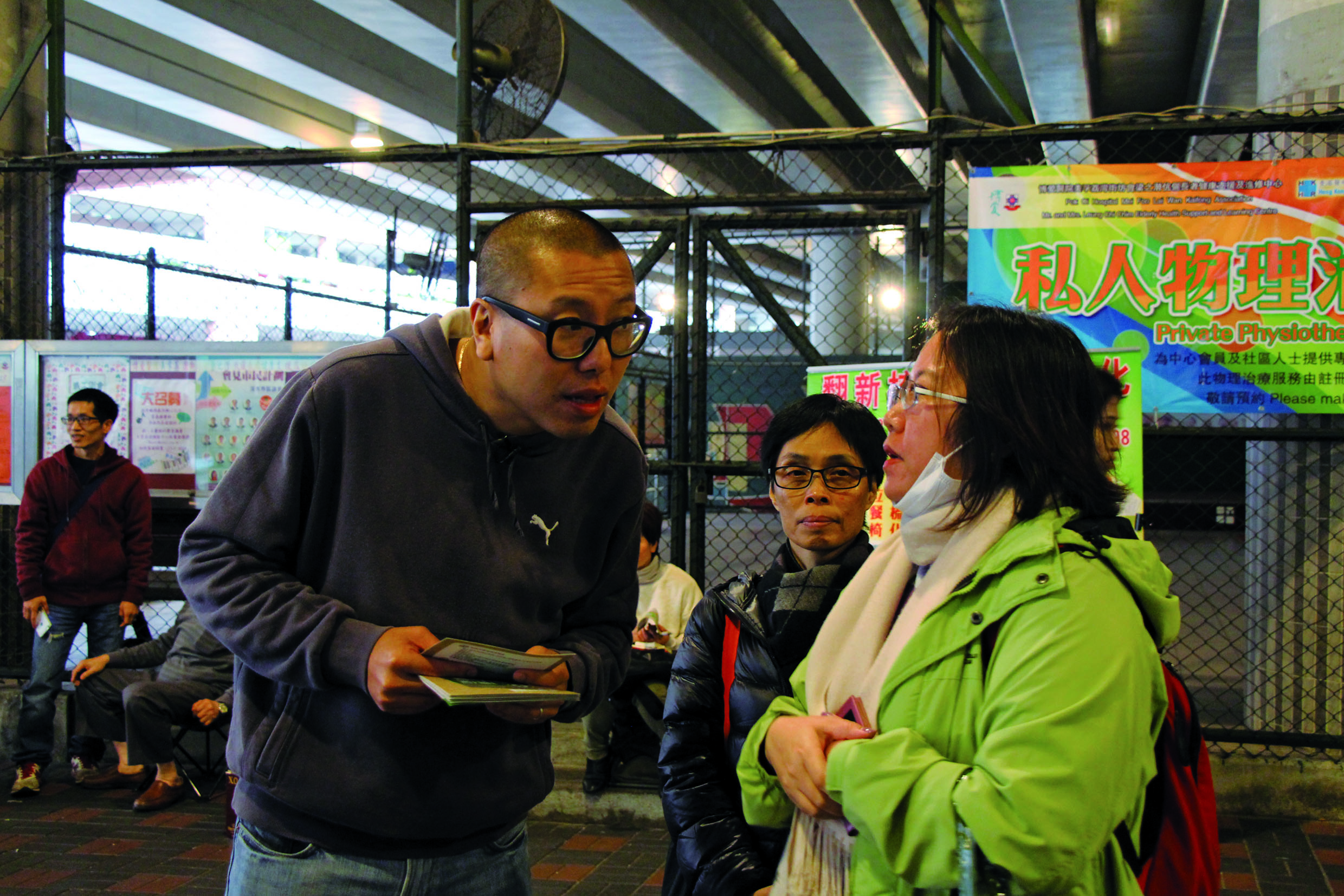Professionals becoming more vocal in upholding core values and democracy
By Julian Ng & Zoe Lai
On August 14 last year, the Law Society of Hong Kong passed a historic motion of no confidence in its president. “We have witnessed one of the most unexpected results in the history of Hong Kong professional bodies,” said Kevin Yam Kin-fung, the 38-year-old solicitor who moved the motion. With tears in his eyes, Yam thanked the society’s members for supporting it.
The unprecedented move came after Beijing issued a white paper on the “one country, two systems” policy in Hong Kong on June 10, 2014. The paper referred to judicial personnel as “administrators”, and said they had to “love the country”. Many lawyers considered this a threat to judicial independence, but Ambrose Lam San-keung, the pro-establishment president of the Law Society, publicly supported the paper. He further drew the ire of some lawyers by calling the Chinese Communist Party “great” in a radio interview.
Eventually, the no-confidence motion was passed with 2,392 votes in favour, and 1,478 votes against. Lam resigned a few days later.
Traditionally, Hong Kong’s professionals, including solicitors, have been seen as not particularly active in politics. With stable jobs and incomes, they tend to support the status quo. But in recent years, more professionals like Yam, have been willing to speak out to safeguard core values and promote democracy.
Yam says the white paper triggered the awakening of legal practitioners, including him. Up till its publication, he was, he says, a June 4 and July 1 democrat, meaning his activities were limited to participation in the annual vigil and protest.
Still, he tabled the no-confidence motion with the encouragement from like-minded solicitors. Originally, he thought it would fail because many veteran solicitors supported Lam. What he had not bargained for was that mainland-backed institutions and the Central Liaison Office would interfere by lobbying solicitors to vote against the motion.
“Once the country’s machinery tried to pressure them, [the solicitors] felt that the profession’s independence was under threat,” Yam says. He thinks this may have prompted more solicitors to support his motion.
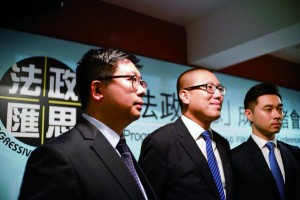
Photo courtesy of Kevin Yam
For Yam, it proved to be just the beginning. On January 27 this year, he announced the launch of the Progressive Lawyers Group to provide a platform for young lawyers to comment on social issues and promote core values, including judicial independence and democracy, in the community. The group now has around 50 members.
At the group’s inaugural press conference, he emphasised it did not intend to challenge the Hong Kong Bar Association and Law Society.
Junius Ho Kwan-yiu, a former president of the Law Society, thinks Yam “wants to participate in politics” but does not think the establishment of the Progressive Lawyers Group highlights problems with the Law Society.
Ho, who organised a counter-protest to support Beijing’s white paper when 1,800 members of the legal profession staged a silent march against it, insists that the 107-year-old organisation is an open platform for all members, including liberal and progressive lawyers, to share their opinions.
He adds that the Law Society has no problem with the discussion of social issues as long it is done from a legal point of view. For instance, it opposed government proposals to bar lawmakers from standing in by-elections after they resigned to trigger a de facto referendum on electoral reform on the grounds it would undermine citizens’ constitutional rights.
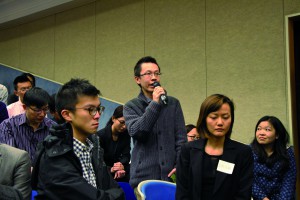
From Yam’s motion to the formation of the Progressive Lawyers’ Group, it seems the legal sector is split into two opposing camps. Ho says this phenomenon is not confined to the legal sector, and that such divisions are essential for a society to develop.
Another profession that appears to be split is the medical sector. On October 21, last year, newspapers published a petition signed by 641 doctors against police brutality during the Umbrella Movement. A week later, another group of 550 doctors published a petition describing the movement as a “cancer” and supporting the police in the enforcement of the law.
The group of young doctors who initiated the first petition formed a concern group, called Médecins Inspirés, in December. They believe that doctors can actively participate in politics, as long as patients’ interests are not affected.
Alfred Wong Yam-hong, a 33-year-old core member of the group, says its members believe that a fair electoral system is indispensable because they see how health policies can fail patients when government is not fully accountable.
As a cardiologist, Wong is dissatisfied with the treatment protocol for heart attack patients in public hospitals, which he believes lags behind other developed societies. “To alleviate this problem, we need a sound political system, an electoral justice system to truly hold our government’s leaders accountable to citizens,” Wong says.
Members of Médecins Inspirés understand the importance of gathering opinions within the sector. The group asked the Hong Kong Medical Association to collect doctors’ opinions on the political reform framework set by the National People’s Congress Standing Committee (NPCSC) on August 31, 2014, but the request was rejected.
However, they persuaded Leung Ka-lau, the legislator representing the medical functional constituency to conduct a poll and to vote according to its results when the government presents its electoral reform package. Leung agreed and the poll showed 55 per cent of 3,066 respondents opposed any proposals drafted within the NPCSC’s framework.
Accepting a request from Médecins Inspirés, Leung also collaborated with the Hong Kong Public Doctors’ Association to hold a seminar to discuss Hong Kong’s political reform on January 11. It was the first time members of the profession had held such an event and around 200 doctors and medical students took part.
The doctors actively expressed their opinions, and some, including Alfred Wong, disagreed with the conservative views of Medical Association chairman Louis Shih Tai-cho.
Shih says some council members of the Medical Association do regard Médecins Inspirés as a challenge to the association but that he is not one of them. “I hold different opinion with them, but I admire what they have done,” he says. He adds that Médecins Inspirés represents a more progressive voice in the sector, which is necessary in promoting the city’s democratic development.
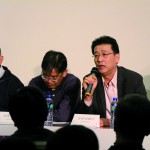
However, Shih says many doctors are conservative compared with professionals from other sectors. He points out that doctors have overwhelming workloads and have no time to participate actively in politics. Older doctors experienced the wave of mass emigration in the 1980s and 1990s as well as SARS in 2003. They usually prefer a society with stable development.
Au Yiu-kai, a 55-year-old doctor and the leader of the Occupy Central Medical Team is an exception. But he agrees the sector is conservative, which is reflected in the lukewarm response to recruitment for the Occupy Central Medical Team.
Au had originally expected to recruit around 200 medical personnel, including doctors, to provide medical support during the planned Occupy Central action, the same number who signed up to support hunger strikers during the anti-National Education movement in 2012. However, he could only recruit around 160 doctors this time.
“It was the government, not us who urged the medical personnel to come out,” Au says. He explains that the use of tear gas, suspected triad members attacking protesters in Mong Kok and police hitting protestors’ heads with batons prompted more doctors to join the team when the class boycott turned into the Occupy Movement. In the end, 5,000 medical personnel joined the team, of which around 300 became active members.
Au thinks it is important for professionals to not only join street protests, but also the Legislative Council Functional Constituency and Chief Executive Election Committee elections. Unlike other citizens, professionals, like doctors, lawyers and accountants, can elect their representatives in these elections. Au won in the 2006 and 2011 Chief Executive Election Committee (EC) elections. He thinks professionals should grasp the opportunity to enter the establishment to express opposing views.
Charles Mok, the legislator representing the information technology functional constituency, agrees with Au that it is important for pan-democratic professionals to participate in elections. A political reform proposal needs the support of two-thirds of LegCo’s 70 legislators to pass. Pan-democrats now hold a one-third veto (27 votes), because they won the information technology, accountancy, medical, social welfare, legal, health services functional constituencies in the 2012 election.
Mok says the protest in which half a million people marched against proposed national security legislation in 2003 led to a political awakening for some professionals and encouraged them to stand in the EC elections in 2007.
He is also the chairman of Professional Commons, which was formed by over 100 pan-democratic EC members from different professions after the 2007 Chief Executive election.
The group later helped pan-democratic professionals to run in the 2011 EC election. They also worked to show citizens that only pro-establishment Chief Executive candidates can win under the current system. “Only when we do this, can the unfairness of the system be emphasised,” Mok says.
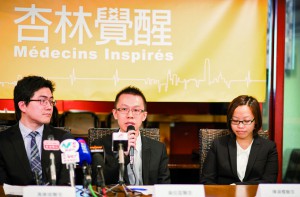
Photo courtesy of Médecins Inspirés
He thinks professionals have been politically awakened, especially after the Umbrella Movement. Some are now recalling the desire they had to apply their expertise to serve society or promote social justice when they first entered their professions, says Mok.
Others have rallied around the democratic cause because they see it as crucial to the development of the sector. Edward Chin Chi-kin, a 47-year-old hedge fund manager and columnist, founded the group, Financial Professionals for Occupy Central, and he says the group members advocate fair play and clean governance which are important to the financial sector.
Chin says he is worried about the hegemony of the city’s tycoons and the deteriorating integrity of government officials. He notes that 0.01 per cent of the population or just a few families, control the supply of daily necessities and electricity through a few listed companies. He is also alarmed that Chief Executive Leung Chun-ying accepted HK$50 million from UGL, an Australian engineering firm without paying tax in any jurisdiction.
Financial Professionals for Occupy Central recently changed its name to HK Finance Monitor 2047 which comprises 120 financial practitioners. In January, they published a list of 10 requests for Hong Kong’s future, including the establishment of a system of genuine universal suffrage, to the Communist Party of China in the Wall Street Journal newspaper.
With the close economic ties between Hong Kong and the Mainland and the growing number of Mainland-related job and business opportunities, Chin says many working in finance are reluctant to join his group or any social movements.
Dixon Sing Ming, an associate professor in the Division of Social Science of the Hong Kong University of Science and Technology, considers this a pity since he thinks professionals have certain advantages in leading social campaigns. He says they are well educated and competent in making use of their networks and articulating their beliefs in the media to mobilize more people to join their campaigns.
Seeming to embody these qualities, solicitor Kevin Yam Kin-fung distributed leaflets on a Saturday afternoon. He was promoting a new community group set up after the Umbrella Movement, Mei Foo Home and Public Affairs, and chatting with people from his neighbourhood. Yam hopes that he can encourage them to care more about the city’s democratic development while also addressing district affairs. “I don’t think professionals have a greater responsibility,” Yam says. “But we have been awakened to the fact that we can contribute to our society with our talents.”
Edited by Macau Mak









































